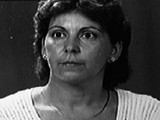 Zehra's Story
Zehra's Story Zehra's Story
Zehra's StoryQ. Why was it important?
I think going to cinema helped the community to be together.
Because, in my village, cinema was a quite new technology and
everyone was going to cinema.
Q. As you said before, it was very enjoyable for you.
What made you think that it was very enjoyable?
If there was a movie on that day, everyone was wearing their
favorite clothes and going there. Before the movie, there was
music. It was like a fun fair. Everyone was there and they were
talking to each other. Everyone was very happy and it helped
people to forget their daily life's problems. I was playing with
other children. When the show was over, my father would promise
me we would come there again. It was one of my favourite things
to do. I really enjoyed it.
Q. Were there any Greeks in the cinema?
Yes. Sometimes they were showing English films and they were
also interested in going there. Of course, they were going also
to Greek films.
Q. Were there any problems or arguments with them? Do you
remember any event with Greek Cypriots?
I never saw any event like that. The atmosphere was quite
friendly.
Q. Did you continue to go to the cinema during the period
of 1963 to 1974?
We couldn't keep going there, because there were many violent
events and we stopped going there.
Q. How were your feelings in that period?
Of course, I was very sad. Because, I enjoyed going to the
cinema and there was no more activity that I could play. That's
why those particular years were very bad for me.
Q. Thanks for your answers.
DEMOGRAPHICS:
Occupation (or life's work): Housewife.
Age: 43.
Sex: Female.
Nationality: Turkish Cypriot.
Where now lives (country and city/town/village): Lefkosa.
Where lived during the events described during the interview:
Evdim village (a village in Limassol).
What was the occupation (or life's work) of the main income
earner in the household when growing up: Her father was a
commander and grew grapes
Education: Graduated from secondary school.